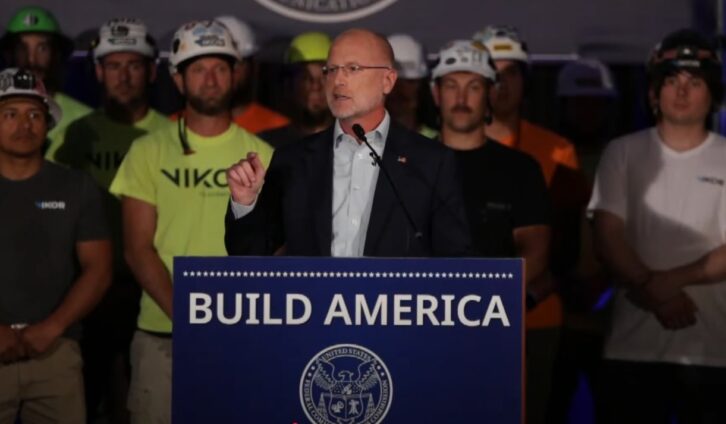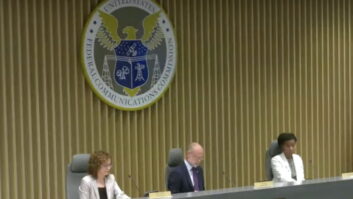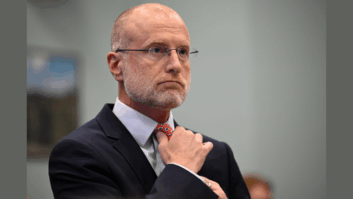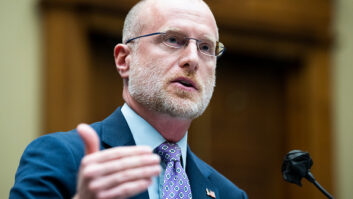
FCC Chairman Brendan Carr has laid out what he calls “a build agenda for America.”
Carr — who has climbed dozens of communications towers, including a 2,000-footer — travelled to the tower climbing training center of telecom infrastructure company Vikor in Sioux Falls, S.D., to give what his office called the first major policy speech of his chairmanship.
In a 4,100-word speech on Wednesday, the chairman described a plan that he said “will unleash high-speed infrastructure builds. We will restore America’s leadership in wireless. We will boost the U.S. space economy. We will advance our national security. And we will strengthen America’s tower and telecom workforce. We will deliver on all of this by implementing smart policies while carrying out a massive and comprehensive deregulatory agenda.”
Carr enthusiastically supported the actions of the Trump administration to date, saying “President Trump is taking quick action to usher in a new Golden Age for America.”
He said the Biden administration had failed to connect millions of Americans to high-speed internet because of “reams of red tape and progressive policies that needlessly delayed the promise of new infrastructure builds.” He also said Biden’s team “fell into the slow lane, our global competitors and adversaries passed us by, and the FCC’s authority to auction spectrum lapsed for the first time ever.”
You can watch the speech or read the text at the bottom of this story. Here is a summary of his major topics:
High-speed infrastructure
Carr listed several steps the FCC should take to encourage the building of high-speed infrastructure.
Among them: “I am announcing today that the FCC will be voting later this month to start a rulemaking that will accelerate the transition from aging copper line networks to the modern, high-speed ones that Americans want and deserve.”
He also wants the FCC to revise and update the agency’s rules that broadband builders and utility pole owners must follow when telecom crews are trying to string new fiber lines.
And he wants to “streamline the many regulations that stand in the way of new infrastructure projects.”
Wireless leadership
The chairman said the commission needs to free up more spectrum. “Doing so is key to restoring America’s leadership in wireless.”
He noted that the FCC has launched a proceeding to look at using more of the mid-band spectrum in the Upper C-Band. This follows FCC action five years ago to auction 280 MHz of the lower portion of the band for commercial 5G.
“In April we launched a proceeding to explore a new licensing framework that could free up 600 MHz of spectrum in the 37 GHz band for new and intensive commercial services,” he said.
Next he will ask the FCC to move closer to auctioning spectrum licenses in the AWS-3 band, which he said “have been laying fallow for years.”
Carr also welcomed action by Congress on the Trump administration’s budget bill. “Restoring our auction authority has proved elusive over the last two years, so I am pleased that Congress appears poised to finally get this done and look forward to implementing the law as passed by Congress.”
Space economy
Carr wants to give a boost to U.S. companies that compete in space.
He said the FCC has been clearing out satellite application backlogs and reducing processing times “at a record pace,” and working to eliminate “unnecessary rules that throttle the satellite industry, such as obsolete power limits and cumbersome siting restrictions.”
The FCC is looking at bolstering security of GPS and opened a rulemaking that could free up more space for satellite broadband.
And he said satellite services in particular are subject to “slow, resource-intensive and bespoke review mechanisms” and that FCC review and licensing process needs to be streamlined.
Modernizing operations
Carr described his previously announced “Delete, Delete, Delete” initiative as “the largest deregulatory effort in FCC history.”
“We took one of our first actions under this initiative last week by eliminating obsolete cable regulations that are no longer relevant or even applicable in today’s modern marketplace.” He said the commission removed 77 rules or requirements, eight forms, 27 pages and 11,475 words from the rulebook.
[Related: “NAB Swings for the Fences in ‘Delete Delete'”]
He announced that the commission plans to move faster. Pending a vote in July, he said, the commission will unveil “a streamlined process for removing regulations at scale without having to go through years of unnecessary legal procedures.”
In a batch to be voted on this month, “we will move directly to delete 40 rules or requirements, spanning more than 17 pages and 7,600 words.” He said the current FCC rules still include “regulations for telegraph, rabbit-ear broadcast receivers and phone booths.”
And he said the FCC is working on modernizing its licensing and other databases. “If you regularly submit filings or ping agency databases, you know there’s a lot of room to make progress on this front.”
National security and public safety
Carr noted that he had established a Council on National Security.
“We have already taken action since January to advance America’s national security, including a sweeping inquiry into the ongoing U.S. operations of businesses that pose unacceptable risks, adopting rules that prohibit Bad Labs (including those tied to the government of China) from participating in our equipment authorization program, and starting a rulemaking to require entities with concerning links to foreign adversaries to disclose those connections.”
He said the commission has “a strong, bipartisan track record when it comes to our work to promote national security.” And he wants to “ensure the U.S. extends its lead over China in the race for critical technologies like 5G, 6G and AI.”
Telecom workforce
And the FCC chairman said his agenda creates new opportunities for blue-collar workers, including tower and telecom workers.
“Providers are now committing to a range of workforce reforms that will result in a more sustainable environment for America’s tower and telecom crews. Carriers are putting new values on your work — ones that better reflect current marketplace realities — and those changes are starting to take effect. Providers are changing their approach to 1099 crews, too, helping to ensure that experienced, well-trained crews get the job at fair prices.”
He said these changes are making it harder for “foreign, fly-by-night crews” to undercut safety.
And Carr told the audience that “blue-collar workers have seen real wage growth of almost 2 percent in the first five months of President Trump’s second term, the largest increase for any administration in nearly 60 years.”
You can read Carr’s remarks on the FCC website, and watch the speech below.






